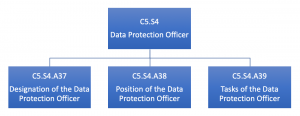Five Interesting Facts About GDPR’s Data Protection Officer (DPO)
David Larance
The recently enforced European Union’s Global Data Protection Regulation (GDPR) introduced a new term that CEOs, Board of Directors, and other senior corporate officials need to start learning more about, the Data Protection Officer. While some “What is a DPO?” articles exist online, I’ve found five additional interesting facts in my review of the new role.
1.It’s so important that committed DPOs an entire section
Image by David Larance
2.Not every company needs a DPO
Article 37’s designation of the DPO is limited to if one of three situations are met.
a) The data processing is managed by a “public authority or body”;
b) The processor’s core business already requires “regular and systemic monitoring of data subjects”; or
c) The processor’s core business is related to criminal activity or in a “special categories” section which includes sensitive data figures such as (race/ethic, political, genetic data, etc.)
3.Companies can contract out the DPO to 3rd a party provider
Article 37.6 clearly states that “The DPO may….fulfill the tasks on the basis of a service contract”. It doesn’t state any additional detail as to whether the DPO must be a full-time position or even if one DPO can fulfill the role for multiple independent organizations. By not explicitly stating the terms of what a valid service contract entails the article appears to legally open the door for a cottage industry of DPOs for hire. Given the stated cost of implementing GDPR by many high profile organizations, it will be interesting to see if firms feel like they reduce head count costs by using a 3rd party to meet the DPO requirements.

Image via aphaia, see references
4.The DPO is essentially a free agent
Article 38 details several elements of the DPO’s role, which when combined paint the picture of an independent role where they get to be a combined data auditor and data subject protector. What makes the role especially interesting is while they “may be a staff member of the controller or processor” they also say that they cannot be penalized or dismissed by the controller or processor and report to the highest levels of management. This provides a legal defense for any DPO wrongful dismissal case while also maintaining that the only people that need to be 100% aware of the DPOs activities are the highest levels of management (who usually are only focused on data privacy issues when an event or breach has occurred).
5.Good DPOs will be hard to find
A good DPO will be a skilled data technician, data privacy expert, and able to navigate complicated business processes within their own organization. They will need to be able to understand and access the back end systems and algorithms that manage their companies data to adequately monitor and test how protected the data actually is while also managing regulator and executive expectations. These two areas of domain when combined are challenging to manage and probably more importantly, challenging to communicate and provide transparency to all stakeholders.
See also:
1. Regulation (EU) 2016/679. (2018). Retrieved from https://eur-lex.europa.eu/legal-content/EN/TXT/PDF/?uri=CELEX:32016R0679
2. What is a Data Protection Officer (DPO)? Learn About the New Role Required for GDPR Compliance?, digitalguardian, (2018). Retreived from https://digitalguardian.com/blog/what-data-protection-officer-dpo-learn-about-new-role-required-gdpr-compliance
Images from:
1. Larance (2018)
2. Do I need a Data Protection Officer, aphaia, (2018). Retrieved from https://aphaia.co.uk/en/2018/03/26/do-i-need-a-data-protection-officer/
